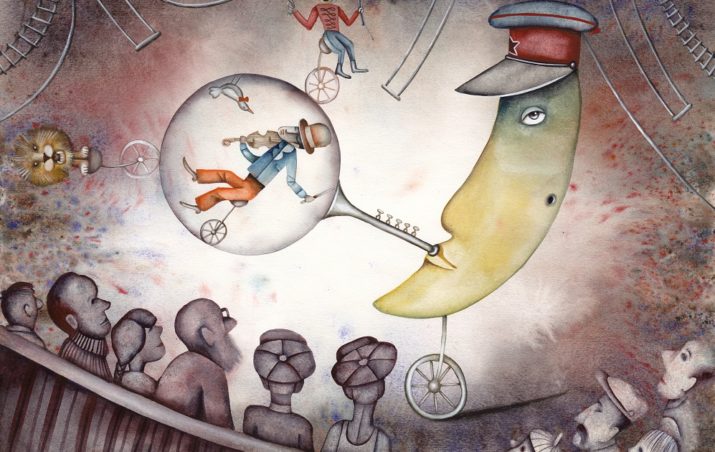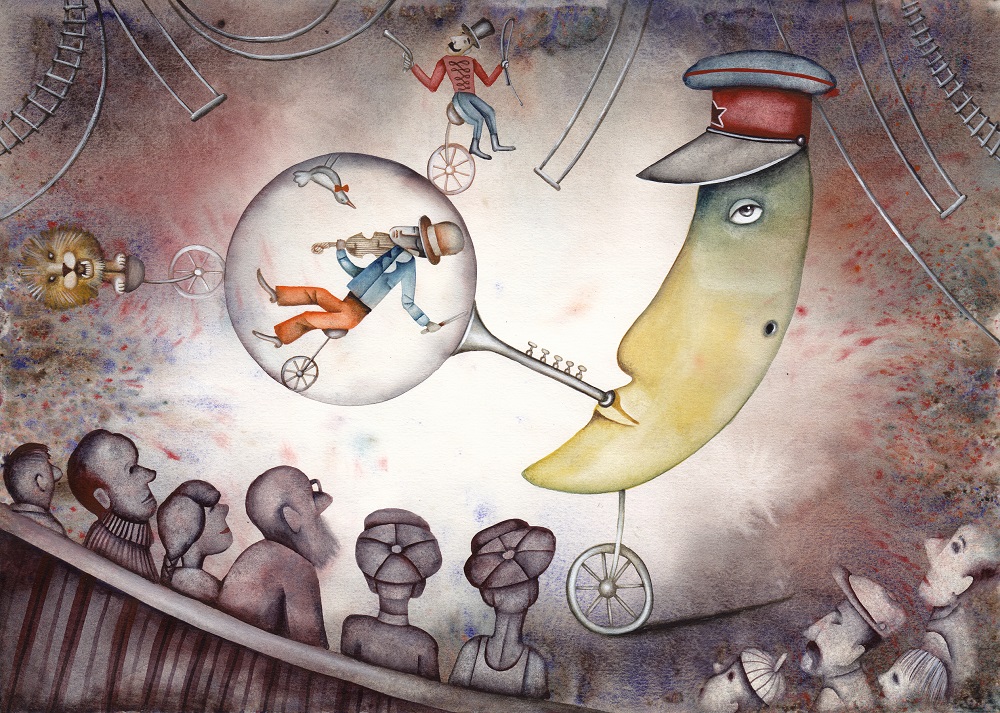

An introduction to our special feature Nationalism, Nativism, and the Revolt Against Globalization.
On the evening of August 11, 2017, a large group of white supremacists, alt-right activists, and neo-Nazis – mostly men, but also a few women – staged a torchlight parade through the grounds of the University of Virginia. Chanting, “You will not replace us” and “Jews will not replace us,” they marched to a statue of the university’s founder, Thomas Jefferson, where they attacked a small group of students, faculty, and staff. The next morning, a much larger crowd – as many as 500 people – gathered a mile away, in downtown Charlottesville, around a statue of Confederate general Robert E. Lee. Participants wielded shields, battle flags, and semi-automatic weapons; they harassed and assaulted local residents who had lined the streets in protest until the police broke up the rally. A small group then adjourned to a nearby park, where they listened to speeches by rally organizers. Meanwhile, a rally participant rammed his car into a downtown crosswalk, killing a young woman, Heather Heyer, and injuring nineteen others.
To observers and participants alike, this American tragedy resonated with echoes of Europe. Most striking were the Nazi symbols, which seemed like relics from another age: swastikas, the Black Sun, cries of “blood and soil.” But there were also more contemporary links. One participant carried a shield with the slogan “nog är nog,” Swedish for “enough is enough,” which is used by Sweden’s anti-immigration activists. The chant “You will not replace us” originated with Identity Evropa, a US-based group that calls itself a “generation of awakened Europeans.”[1] It is an offshoot of the Identitarian movement that began in France and has close ties to Germany’s anti-Islamic front, PEGIDA. The rally’s main organizer, Richard Spencer, runs a so-called think tank “dedicated to the heritage, identity and future of European people.”[2] Another speaker, Matthew Heimbach, models himself on the Romanian fascist Corneliu Codreanu and calls Russia the “leader of the free world.”[3]
Such contacts suggest that the Charlottesville rally was part of a broader movement – and indeed Europe saw many similar rallies in 2017. Perhaps the biggest took place in Warsaw in November, when some 60,000 people marched to chants of “pure blood” and “white Europe.”[4] Anti-immigrant demonstrations are on the rise across the continent, and so, too, are anti-immigrant assaults. Over 3,500 (nearly 10 a day) were recorded in Germany in 2016 alone,[5] including 595 beatings and 116 arson attacks.[6] Such violence in the streets has only strengthened far-right parties at the ballot box. In the past year, the Alternative for Germany and the Austrian People’s Party placed third in their countries’ parliamentary elections, while the Dutch Party for Freedom finished second. By political scientist Matt Golder’s account, “far right parties have participated in coalition governments in Austria, Croatia, Estonia, Finland, Italy, Latvia, the Netherlands, Poland, Serbia, Slovakia, and Switzerland, and they have supported minority governments in Bulgaria, Denmark, the Netherlands, and Norway.”[7]
This special issue examines the resurgence of far-right groups, considering how recent events in Charlottesville can illuminate radical movements in Europe. It focuses on three key elements: nationalism, nativism, and the revolt against globalization. Nationalism was the word most associated with the Charlottesville rally, whose participants often called themselves “white nationalists.” By this, they meant that a racialized national identity should be the condition for political belonging. For Spencer, the dream is a racial “ethno-state” to be achieved through what he calls “peaceful ethnic cleansing.”[8]
The notion that the political and the national unit should be congruent is broadly in line with Ernest Gellner’s famous definition of nationalism as “primarily a political principle, which holds that the political and the national unit should be congruent.”[9] However, the commitment to a perfect synthesis of state and nation can take many forms. It can mean banning Muslim headscarves, as French courts did in 2010, on the grounds that they run counter to republican national values such as laïcité, gender equality, and democracy. It can mean banning political opponents, whom leaders from Vladimir Putin to Jarosław Kaczyński routinely call “national traitors.” And it is also this commitment that drives Europe’s many separatist movements, which promise to align state with nation. The trouble, of course, is that those are two incommensurable units: one legal and the other “imagined,” “constructed,” or “voluntaristic.”[10] Making them congruent, as Gellner pointed out, is likely to generate intense passions.
“Nativism,” the second term guiding our inquiry, originated in the 1840s in reference to US Know Nothing party – formally called the Native American Party. While it has not been widely applied to Europe, it highlights important parallels between far-right movements on both sides of the Atlantic. Most prominently, they share an intense hostility to immigrants, especially those of a different race or religion. Anti-immigrant sentiment, Elisabeth Ivarsflaten has found, is the thread that links the vast array of Europe’s right-wing populists; it is the only grievance that has been “consistently mobilized by all successful populist right parties.”[11] But what separates nativism from mere xenophobia is its eugenic obsession with blood, birth, and health. For Spencer, “‘immigration’ is a proxy for race”: it produces a “miscegenated” nation and destroys whites’ “biological and cultural continuity.”[12] Such language has long been a fixture of Europe’s far-right groups, which habitually describe immigrants as “parasites” and “cancers.” Drawing from a deep well of anti-Semitism, they also portray ethnic minorities as sexual predators – a view aptly summed up by the portmanteau “rapefugees,” often seen on PEGIDA banners. Here the body politic is clearly female, and its vital function – reproduction – threatened by migration of any kind.
Accordingly, one of the far-right’s greatest bugaboos is the idea of globalization. The grievances are partly economic, fueled by fears of lost jobs and profiteering elites. The rhetoric of two worlds, a “France of winners” and a “France of losers,” was a fixture of the 2017 presidential elections. But the concerns with globalization run deeper. For Richard Spencer, it impinges on the natural order of things, mixing together what is properly kept apart. “Identitarianism acknowledges the incommensurable nature of different peoples and cultures,” he writes, “and thus looks forward to a world of true diversity and multiculturalism.”[13] Europe’s far-right groups view globalization as an assault on national sovereignty and identity. Marine Le Pen, in her first campaign speech, equated globalization with “Islamic fundamentalism,” since “both are working to make our nation disappear.”[14] Such critiques engender a politics of outrage, fueled by a sense of being under siege. That is why Charlottesville’s rally centered on a statue of Lee, which the city council had recently voted to remove. Global forces like political correctness, organizers claimed, had conspired to threaten local culture – identified, in their minds, with the “lost cause” of the Confederacy.[15] The same logic drives widespread criticism of Brussels and the European Union, distant actors that are easily portrayed as meddling. It can also take overtly anti-Semitic forms: “the Goyim know,” read a placard in Charlottesville, evoking the old trope of a worldwide Jewish conspiracy. The revolt against globalization frames far-right groups as underdogs, bravely fighting more powerful forces. By making the strong feel defensive, it often serves as an incitement to violence.
It is a well-known paradox that nationalism is transnational: all nations claim to be unique, but in strikingly similar ways. The same seems to be true of far-right groups, as the Charlottesville rally suggests. Such groups now share tactics, symbols, and beliefs, honed in the echo chambers of the internet, or, increasingly, through in-person meetings. In December, nine of Europe’s far-right parties met in Prague to discuss joint strategy in – and against – the European Parliament. Several larger congresses have convened in Russia, which bills itself as the leader of the World National Conservative Movement. But if the global far-right is growing interconnected, so, too, are its opponents. In the days after Heather Heyer’s death, “vigils for Charlottesville” took place in many European cities, from Galway to Paris to Athens. Heyer’s name has also been coopted for various local causes – such as a women’s protest against another far-right march in Warsaw.
Charlottesville, Virginia, has unexpectedly become a reference point in European politics, a fitting launching pad for the diverse research, interviews and art presented here to investigate nationalism, nativism, and the revolt against globalization in Europe – and beyond. Charlottesville also invites a rethinking of curricular development and pedagogical approaches as an attempted response. The Campus pieces draw from journalism, student and faculty testimonials as well as campus collaborations, encouraging true interdisciplinary and transatlantic dialogues as part of some pressing global issues.
Jan Willem Duyvendak and Josip Kesic’s “The Rise of Nativism” considers the radical right-wing desire in the Netherlands to “preserve” the “Dutch character” as just one example of a much broader trend for monocultural purity across Europe. The paper argues that, to fully understand the various degrees and subtypes of nativist discourses, which claim to protect Europe as an entity of culture and tradition, right-wing parties must be examined through the lens of nativism with nationalism as an ideological background.
Ambassador John Shattuck, former President of Central European University, addresses the transatlantic threats to liberal democracy and global civil society, which have been exacerbated by economic, cultural, and security anxieties that liberal democracies have failed to address. Populist governments, on the other hand, capitalize on this deficiency, as the example of Hungary, where Orban has manipulated the political and even academic landscape, clearly reveals.
Once right-wing party promises are not fulfilled, many liberal voters hope, voters will see right through them and liberal democracy will be reestablished. However, the article “Poland, a ‘Normal’ European Country” by Agnieszka Pasieka focuses on “scorn” and “shame” to explain a long-time nationalistic orientation in a strongly polarized Polish public sphere, examining how the debate about social policies is framed and why Polish people have grown tired of “pleasing” Europe.
The events in Catalonia in the fall, spurred by political and especially harsh economic conditions during the last decade, challenge the very unity of Spain and its capacity to include diverse, cultural identities. Juan Andrés García Martín’s article “The European Union, Spain and the Catalan Question: An Affair Beyond the Spanish Border?” examines the rise of Catalan nationalism, its desire for international recognition and the EU’s corresponding position.
The article “Between Nativism and Indigeneity in the Kabyle Diaspora of France” by Jonathan Harris, argues that the leaders of the Kabyle diaspora, the Provisional Government of Kabylia (GPK), have assumed an ambivalent position to draw some advantages from French nativist-populist discourse, consequently, adopting a nativist populism of their own; at the same time, though, the GPK is opposed to the anti-immigration and racist elements which threaten it.
“Make America Great Again” to President Trump means the protection of his country’s economic interests against multilateral “bad trade deals,” calling for more national sovereignty. Peter Debaere’s “Globalization Under Fire,” argues that globalization per se is not the problem, but rather those who have disproportionately benefited from its gains and demonstrate an unwillingness to share. The article also argues that globalization, despite its bad press, has its benefits and that domestic protectionism is not the answer.
In populist rhetoric, migrants emerge as perceived threats to the economic and welfare systems and to culture and tradition by, for instance, “Islamizing” their new European home countries. In the curated show “Home and (Be)Longing,” artist Do-Ho-Suh’s translucent fabrics and mathematical processes create works built around the idea of home; however, his collapsible fabrics interrogate the connotations of “home” and “belonging.” Korean-born artist Insoon Ha’s work deals with the rhetoric of rape, disturbance and aggression that so often marks today’s political agenda, revealing that we are far removed from equality, particularly when it comes to gender.
Research
– “The Rise of Nativism in Europe” by Jan Willem Duyvendak and Josip Kesic
– “Globalization Under Fire” by Peter Debaere
– “Between Nativism and Indigeneity in the Kabyle Diaspora of France” by Jonathan Harris
– “Poland, a ‘Normal’ European Country” by Agnieszka Pasieka
Commentary
– “Refections on The Czech Election” by Jan Čulík
– “The Essence of Our Era: Yukio Mishima, Steve Bannon, and the Alt-Right” by Christopher Impiglia
Campus
– “Our City, Our Streets!” by Esther Dischereit, translated by Jeffrey Grossman
– “Global Focus: An interview with Janet Horne” by Maria Lechtarova
– “The Past in the Present: Transatlantic Teaching and Research Collaboration on Memory, Responsibility, and Transformation” by Manuela Achilles and Hannah Winnick
– “First Response: A Reading List” by Kyrill Kunakhovich, Manuela Achilles, and Janet Horne
Fiction
Poetry
– Four Poems by Antonio Machado, translated from the Spanish by Daniel Evans Pritchard
Nonfiction
– “Par Amouricana” by Joshua Kleinberg
Reviews
– Liberty or Death: The French Revolution, reviewed by Donald Sutherland
– The Crisis of Multiculturalism in Europe: A History, reviewed by Michelle Kahn
Interviews
Visual Art
– Home and (Be)Longing, curated by Nicole Shea
Manuela Achilles is an Assistant Professor of German and History as well as the Director of the interdisciplinary Center for German Studies at the University of Virginia. She has published broadly on the political culture of Weimar democracy and is currently completing her book manuscript, Invisible Fatherland: Constitutional Patriotism and the Desire for Democracy in Weimar Germany. Achilles’ second research interest revolves around green politics and practices, including the German Energy Revolution. Together with Dana Elzey, she is the editor of Environmental Sustainability in Transatlantic Perspective: A Multidisciplinary Approach (Palgrave MacMillan Energy, Climate and the Environment Series 2013).
Kyrill Kunakhovich is Assistant Professor of History at the University of Virginia. He teaches courses on communism, fascism, nationalism, and the Cold War. His current book project, entitled Culture for the People: Art and Politics in Communist Poland and East Germany, considers how art and culture helped to make, and then unmake, the Soviet Bloc.
Nicole Shea is the Director of the Council for European Studies at Columbia University and the Executive Editor of EuropeNow.
Photo: The Totalitarian Circus – Allegory of the Autocracy by Eugene Ivanov | Shutterstock
Published on February 1, 2018.
References
[1] https://www.splcenter.org/hatewatch/2017/09/26/identity-evropa-and-arktos-media-%E2%80%94-likely-bedfellows
[2] https://www.salon.com/2013/10/29/white_separatists_are_afraid_of_the_future/
[3] http://www.businessinsider.com/russia-connections-to-the-alt-right-2016-11
[4] https://www.washingtonpost.com/news/worldviews/wp/2017/11/12/pray-for-an-islamic-holocaust-tens-of-thousands-from-europes-far-right-march-in-poland/?utm_term=.9d0a25738a1f
[5] http://www.bbc.com/news/world-europe-39096833
http://www.dw.com/en/more-than-3500-attacks-on-refugees-in-germany-in-2016-report/a-37719365
[6] [6] https://www.proasyl.de/news/gewalt-gegen-fluechtlinge-2017-von-entwarnung-kann-keine-rede-sein/
[7] Matt Golder, “Far Right Parties in Europe.” The Annual Review of Political Science 19 (2016), 477-97, here 477.
[8] https://www.nytimes.com/2016/11/22/world/americas/white-nationalism-explained.html
[9] Ernest Gellner, Nations and Nationalism (Oxford: Blackwell, 1983), 1.
[10] Benedict Anderson, Imagined Communities: Reflections on the Origins and Spread of Nationalism (London: Verso, 1983); Gellner, Nations and Nationalism, 7.
[11] Elisabeth Ivarsflaten, “What Unites Right-Wing Populists in Western Europe? Re-Examining Grievance Mobilization Models in Seven Successful Cases.” Comparative Political Studies 41: 1 (January 2008), 3-23, here 17.
[12] https://www.splcenter.org/fighting-hate/extremist-files/individual/richard-bertrand-spencer-0
[13] https://www.splcenter.org/hatewatch/2015/10/12/american-racists-work-spread-%E2%80%98identitarian%E2%80%99-ideology
[14] https://www.politico.eu/article/marine-le-pen-globalization-campaign-launch-french-politics-news-lyon-islam/
[15] See, e.g., Gary Gallagher and Alan T. Nolan (eds.), The Myth of the Lost Cause and Civil War History (Bloomington: Indiana University Press, 2000).




